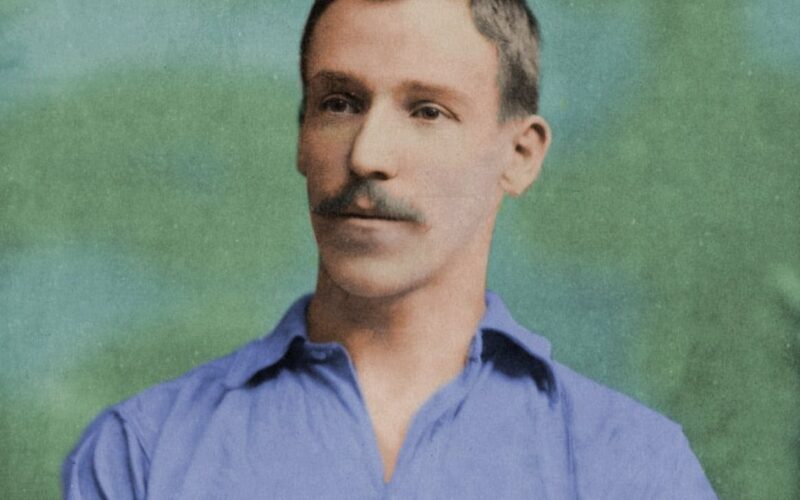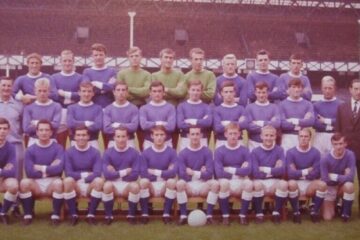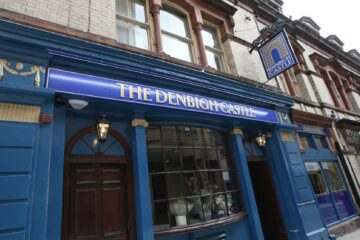By Rob Sawyer
[Above photo: Dickie Boyle of Everton c.1894
(colourised by George Chilvers) ]
Everton was awash with Sons of the Rock in the early years of the Football League: fellow Dumbarton-raised John Bell, and the long-serving Jack Taylor, the latter being the captain of Everton’s first victorious FA Cup side in 1906. No less vital and dedicated to the Toffees cause in the last years of the nineteenth century was Richard Hill Boyle. Commonly known as Dickie (or Dicky), he was one of those indomitable Everton servants, like Peter Farrell and Mike Lyons, who never earned the silverware he merited.
Born on 24 September 1869, Dickie was raised by parents William (originally from Ireland) and Margaret, residing at 1 Clyde Street in Dumbarton. Early football experience came with Dumbarton Episcopalians, Dumbarton Union and Methlan Park, before he joined the ranks of Dumbarton FC in 1890. He was a key member of the team which topped the Scottish League Championship twice (one being a tie with Rangers) at the dawn of the new decade. However, with the Sons of the Rock remaining avowedly amateur in outlook, teams from south of the border were finding ways to tempt Dumbarton players to sign for them.
With the 1891/92 season concluded, agents for Nottingham Forest came to the town, targeting John Bell and Dickie. For the latter, who earned his keep as a shipyard draughtsman, it was a case of being doorstepped – quite literally.
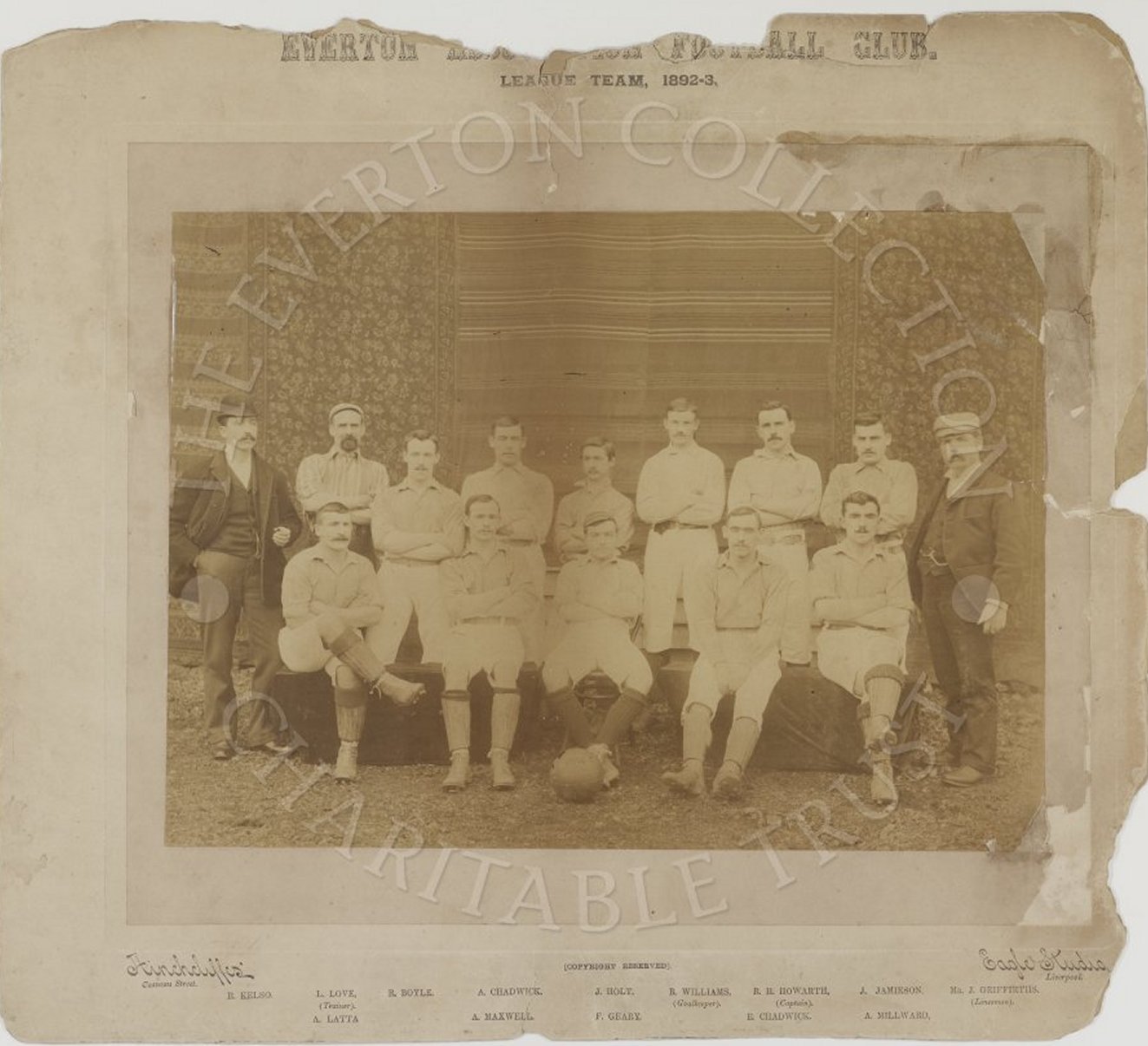
Richard Boyle third from left, back row (The Everton Collection)
The Lennox Herald reported:
‘Dicky Boyle, Dumbarton’s centre half-back, had a rather novel experience on Sunday. About five o’clock in the morning he was ‘rapped up’ by the same parties [that had visited John Bell] and invited to drive with them to Glasgow in a car, which was in waiting. Dicky demurred to do any such thing, and terms something similar to those offered Bell was proffered. Boyle tried to advance the price, but it got too big, and the Englishmen said they had another good man ready to take their offer, although they certainly would have preferred the Son of the Rock.
Asked if he had any particular place to go to that day, Dicky said ‘Yes, to church’ and his interviewers left with perhaps a better opinion of Scotch [sic] football players than they had entertained before. This did not end the matter, however, for at eleven o’clock on Sunday night, and again at one o’clock on Monday morning, Mr Boyle was visited with the view of his services being secured. It was of no use, however, and the game bag was taken home empty. These proceedings have roused the Dumbarton Vigilance Committee, and if any more agents take a turn down this way they should be prepared for a hot reception.’
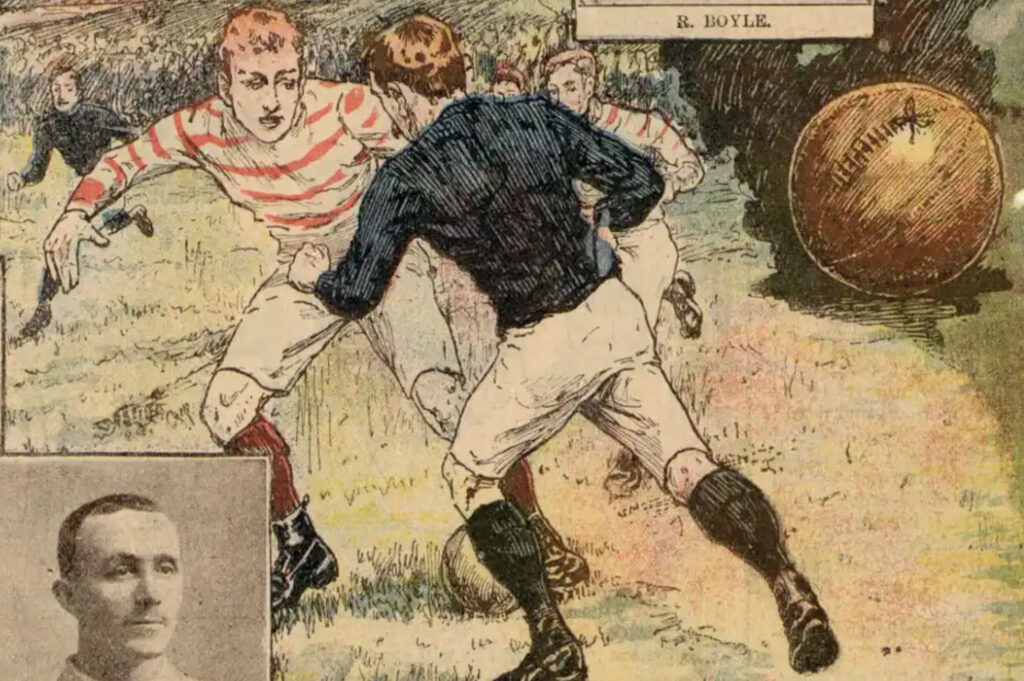
The Dumbarton FC ‘Vigilance Committee’ clearly lacked teeth, as in mid-August, an Everton delegation came to Dunbartonshire, seeking the services of Messrs Bell and Boyle. With terms agreed, Dickie wrote to the Dumbarton club committee, notifying them of his resignation ‘in business-like form’ in the words of the Glasgow Evening News, which went on to comment: ‘Boyle’s withdrawal is a severe blow to Dumbarton, as he was a man they could always rely upon, and did much to maintain the esprit du corps of the team.’
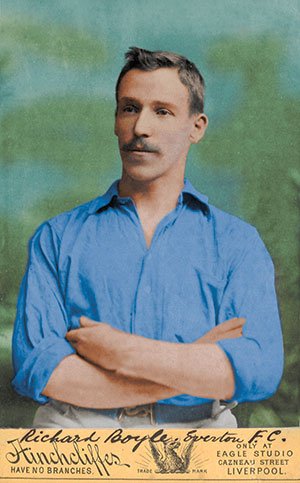
(colourised by George Chilvers)
The announcement of Dickie’s capture was met with despondency by the new occupants of Anfield, who were in the process of building a team in the wake of Everton’s departure for Goodison Park. John McKenna of Liverpool FC had been assiduously pursuing the signatures of Bell and Boyle for much of the summer – but to no avail. He did, however, find himself the intended victim of a scam, as detailed in the Athletic News, some years later:
Mr McKenna had had several fruitless excursions in the hope of securing John Bell and Richard Boyle, of Dumbarton. But when same men asked for £150 as a signing fee, £3 a week all the year round, and a situation in the summer; Mr McKenna mildly inquired if they would not like one of the Liverpool docks thrown in as a bait. No terms would, however, induce Jack Bell and ‘Dicky’ Boyle to go South. No doubt they had set their minds on Everton.
One morning a messenger arrived at Mr. McKenna’s house, saying Bell and Boyle were in Liverpool and had been up to the Anfield ground the previous evening, and were ready to sign on. This seemed too good to be true. However, Mr. McKenna was requested to keep an appointment at a well-known hotel. He went, and took John Miller, of Dumbarton, with him. They met a ‘young gentleman’ who announced himself as the real Simon Pure, the veritable Dicky Boyle, and he was willing to sign for a comparatively modest consideration. Mr. McKenna knew that the man was a rank impostor, and the ‘young gentleman’, under the stimulus of a boot-toe, propelled by a lusty leg, made tracks from that hotel. He disappeared with a celerity worthy of a record sprinter. His address is not known.
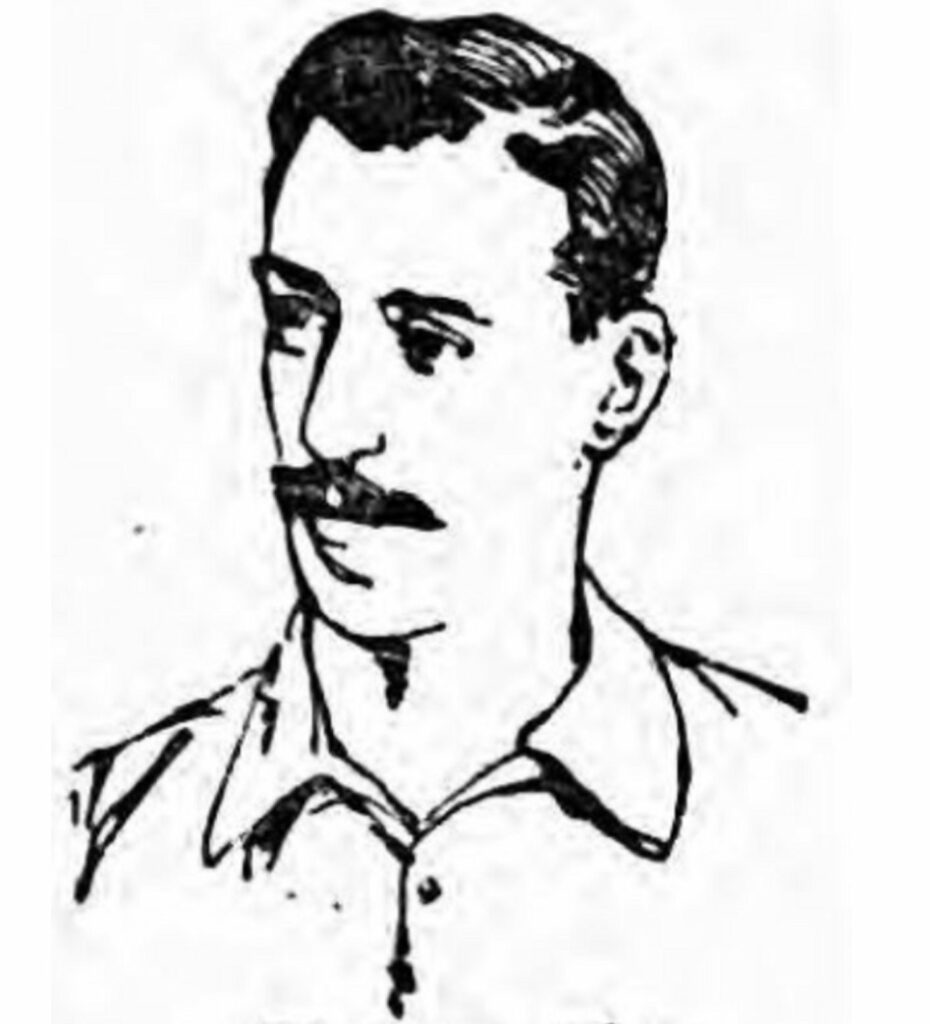
Neither Everton nor other English clubs were able to persuade John Bell to quit Dumbarton at the same time as his clubmate – but the Toffees would get their man the following year. Within a week of Dickie’s arrival on Merseyside, he lined up at wing-half in the very first match staged at Goodison Park – joining fellow Dumbarton man Alex Latta in the Everton side which defeated Bolton Wanderers in the exhibition match. Two days later, he had the honour of making his Football League debut at the same time as Goodison Park. The Scot hit the woodwork with one effort and, according to Cricket and Football Field, “‘Played Boyle!” re-echoed all over the ground.’
Noting his diminutive stature (he was 5’ 6’ and far from burly of frame), the Liverpool Football Echo correspondent felt that Toffees had got a good’un, based on his first competitive outing: ‘In Boyle, of Dumbarton, the club appear to have a genuine player, although on the “light side”. He displayed wonderful judgement in the first match for Everton and should be an acquisition to the team.’ The Liverpool Mercury, meanwhile, pronounced: ‘The half-backs are all pleasing. Boyle by his skilful tactics making a host of friends.’
In spite of the auspicious start to his career in Liverpool, Dickie would later admit that he had to adapt to the English style:
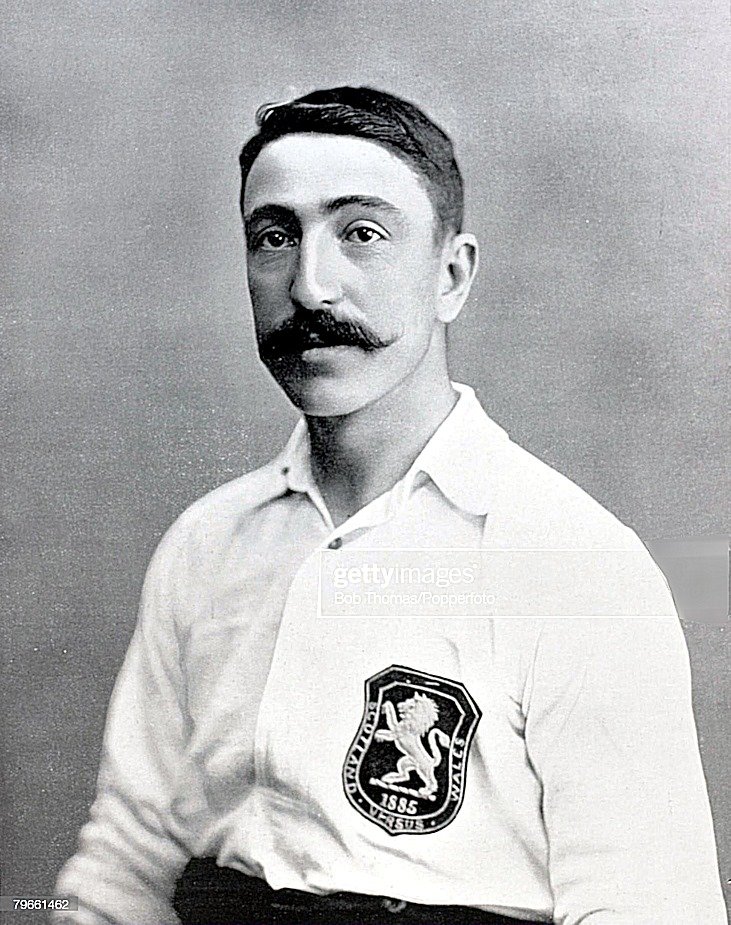
When I went from Dumbarton to Everton, I found a big difference between the game played there and what I was accustomed to in Scotland. In England the forwards were speedier, and the moves generally struck me as being more intelligently thought out. My partners in the half-back line were Holt and Stewart; I did my utmost to follow their style of play, and it was in my early Everton days that I began to understand the finer points of half-back play.
We used to have an almost perfect understanding. If I went for one forward, he took the other. If he was beat, I covered him up. By watching what each other was going to do we made our work much easier, and at the same time rendered it more difficult for the opposing forwards to break through. Kelso used to shout to me when necessary, and I did the same to him; we had the utmost confidence in each other, and even if his back was to me, and he was preparing to take the ball, he would leave it to me if I gave the word. Our idea was that the man in the best position should clear.
He went on to describe the solid partnership which developed with Toffees right-back Bob Kelso:
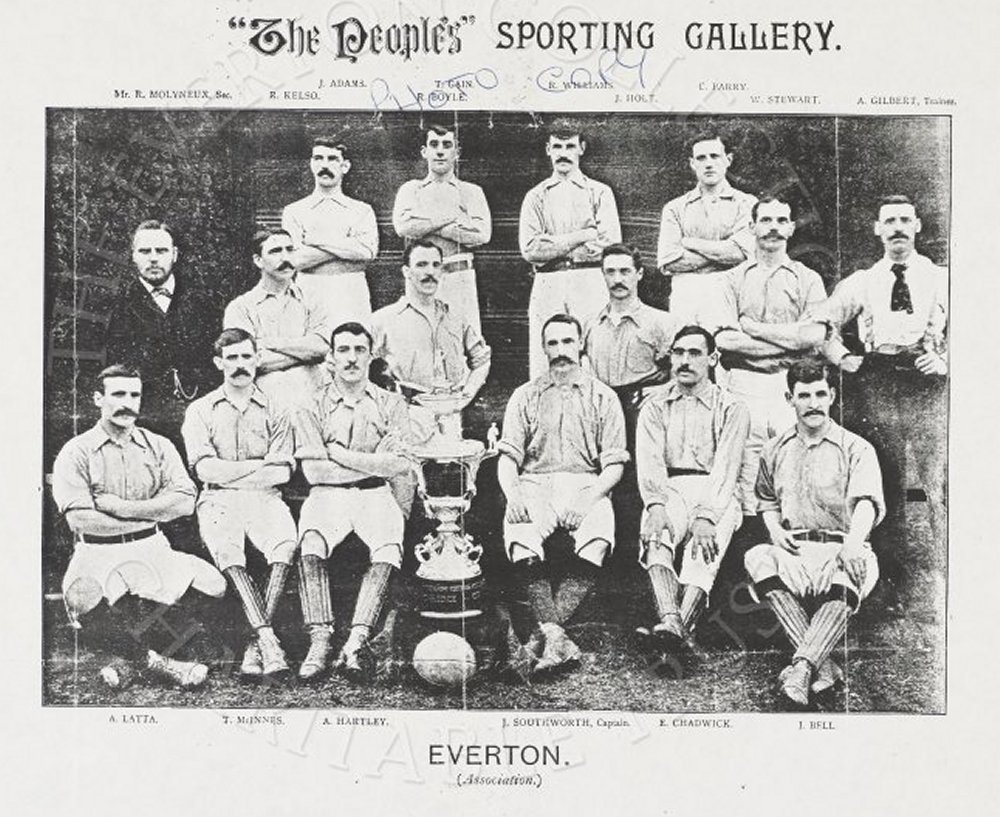
– Dickie Boyle pictured centre
For eight years this diligent, yet gentlemanly wing-half, was a mainstay of the Toffees in their impressive new home. A measure of his value to the team was the award of the club captaincy in the summer of 1895, standing down a year later before becoming skipper again in 1897. The closest he came to winning anything of note were the FA Cup Finals of 1893 and 1897. In the 1897 match he scored a free-kick against Aston Villa to give the Toffees a 2-1 lead, but saw his team concede twice to miss out on glory. In domestic life, Dickie had married Isabella (Isa) Sinclair (they had no children). In their time in Liverpool, they resided at 11 Alroy Road in Walton, adjacent to Liverpool’s stadium.
Everton challenged the League title during the 1901/2 season – but by this point, Dickie was on the periphery of the team, having lost his place early in the season. During the run-in he was recalled to fill-in at right-back, and did so with distinction. In a fixture in April, with the title challenge having abated, he gave an assured display at Sheffield on a pitch resembling a quagmire. The Liverpool Mercury described the conditions thus: ‘Such as to render abortive anything like a decent exposition of scientific football. Rain came down in torrents, the ground was a perfect quagmire, and the pitiful handful of spectators who found shelter under the corrugated canopy of the grandstands were well-nigh chilled to the marrow and the ninety minutes had expired.’
The newspaper’s correspondent singled out the Scottish veteran, playing in an unfamiliar position, for praise: ‘One of the most pleasurable features of the game played under such distressing circumstances was the really fine defence of the right back-Boyle, who has given so many years of valuable and ungrudging service to the Everton Club. His kicking, and tackling were at times of the greatest assistance to his side. Boyle’s scientific tackling and kicking asserted itself.’
That spring, with his distinguished career as a Goodison Park player coming to an end, Dickie had put himself forward for the vacant position of Everton FC’s Company Secretary. Ultimately, the club plumped for Will Cuff – a sensible choice, as things panned out. However, there was a suspicion in some quarters that Dickie’s bid for the role put noses out of joint at the club and hindered his chances of selection for the first team. Describing the Everton AGM held in June 1902, the Liverpool Mercury reported on the fiery proceedings:
Mr. Maver a shareholder said there was a feeling that Boyle had been dropped because he went in for the secretaryship. It looked very much like it. (‘Hear, hear’). The man had served the club nine years, and a more gentlemanly player never kicked a ball. He suggested that the board should come to terms with Boyle. (Loud applause).
The Secretary (Mr. W. Cuff) read the names of the players who had signed on for the next season…Some discussion followed with regard to the position of Boyle, several shareholders complaining that he has not been well treated by the directorate. The Chairman stated that Boyle had been treated well; he had a good benefit (“No no”.)- and he had been given a free transfer. An irregular dissension followed in which the allegation was made that the board had parted with Boyle, because he had applied for the secretaryship. This the Chairman denied. The Chairman and the board endorsed the opinion of Boyle qualities, but they though it desirable to have a change (“Why, why?”). A shareholder deuced to move a resolution that arrangements be made with Boyle for next season, but the Chairman declined to accept such a motion.
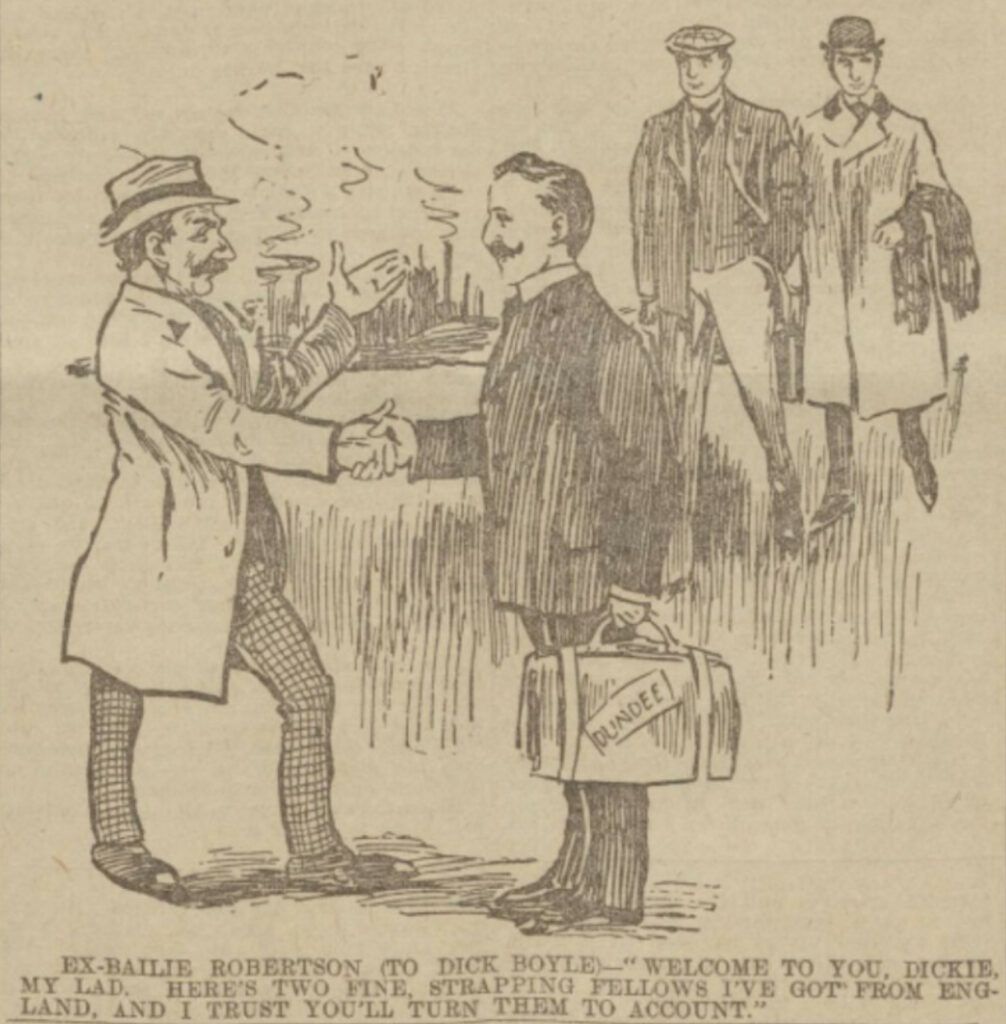
Within a week of the AGM, Dickie was gone – bound for Dundee FC on a free transfer. The Athletic News felt that his departure from Goodison was premature: ‘Boyle has plenty of good football in him yet, and he is one those intelligent players that would exercise a wholesome influence on the reserve team. There is such a scarcity of this type of player that to part with one is, I consider, a matter to be deplored.’ The Dundee Evening Telegraph described the new signing as ‘an alert, untiring half back…who should prove a capital player for Dundee’ In his home debut, against Queens Park it was noted that ‘Boyle caught the eye at times with capital placing and tackling.’
The half-back gave The Dee four seasons of doughty service, making 84 appearances. One report in the September 1905 edition of the Scottish Referee periodical described him as ‘playing with much vim and cleverness.’ Once, he outlined how abstinence contributed to his longevity on the pitches of England and Scotland: ‘I don’t smoke or drink myself. I don’t object to others doing so, but the footballer who wishes to excel can be doing with as little alcohol and nicotine as possible. I know players who smoke a good deal before a match; it does not seem to affect them, but the young player should learn to do without his pipe and cigarette on Saturday forenoon. He will feel all the fresher at the end of the ninety minutes.’
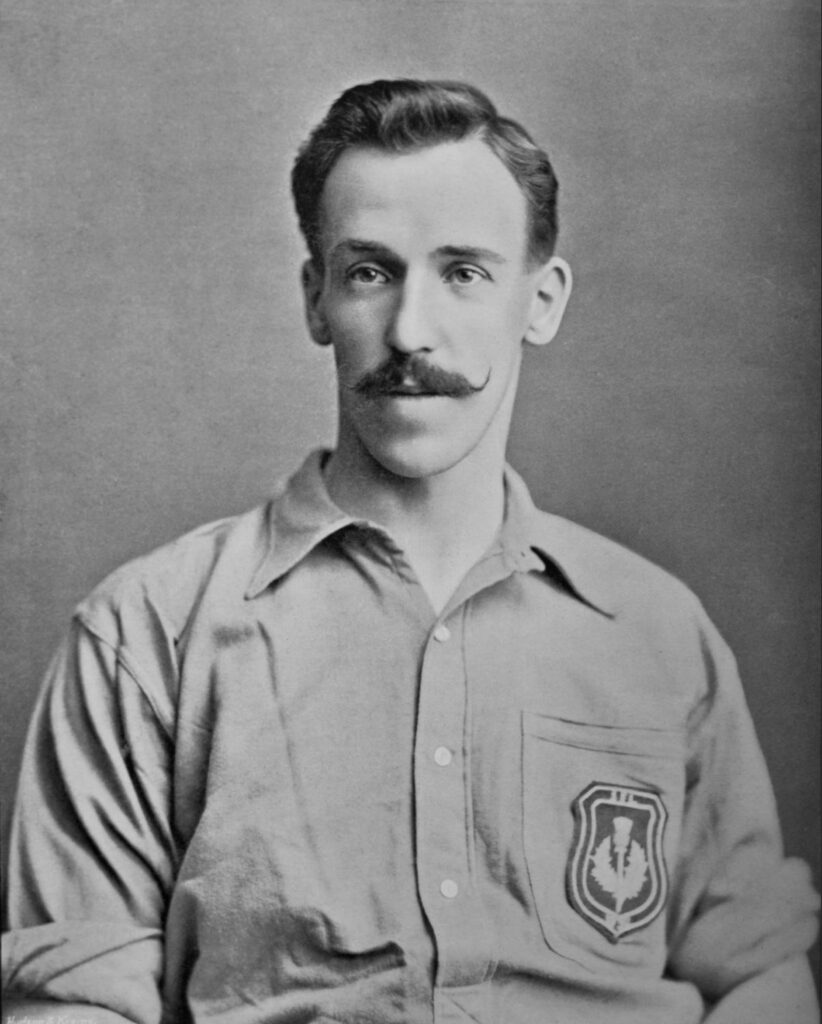
In 1906 he left Dundee, taking up a position of draughtsman at nearby Dundee shipyard. The football boots had not been hung up for good, and as an amateur he turned out for Caledon Shipyard team. He also got involved with coaching in the Dundee City Boys League, even refereeing matches, on occasion. He bid a fond adieu to Tayside in January 1910 when he accepted a position at a Glasgow shipyard and settled in Renton, close to his hometown. The move disappointed Hibs who had aspirations to see him make a comeback with them. Later that year he sat referee qualification exams but there is no record of him officiating matches at a high level. He had not lost complete touch with Merseyside – a spent a brief holiday in Liverpool in the 1920s, being described in the local press as ‘wearing particularly well.’ Dickie passed away on 24 May 1947 and lies in an unmarked grave.
Oddly, this accomplished player only received recognition in his native country once, when selected for a Scottish League representative side to play an English League XI in March 1892. His move to England perhaps undermined his chances of an international call-up. However, his value at Goodison was never underestimated. One newspaper summed it up neatly: ‘His eight years’ service with a “gate” so fastidious as the notorious one at Goodison Park is sufficient testimony to his worth.’
Credits:
George Chilvers (photo colourisation)
Play Up Liverpool website
Billy Smith (bluecorrespondent.co.uk)
Jamie Yates
Various regional newspapers

